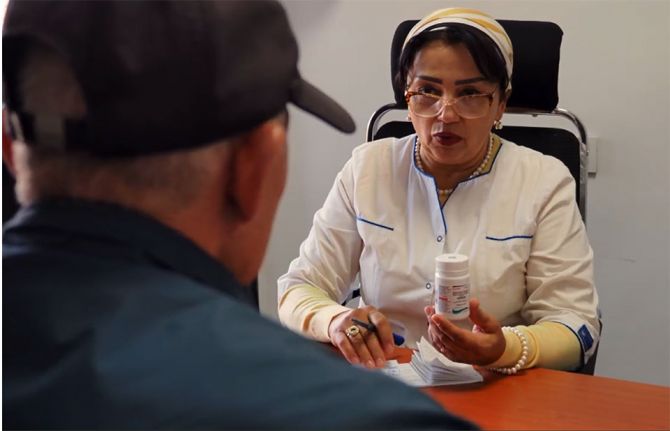
Feature Story
Young people in Tajikistan help each other prevent the spread of HIV
12 January 2011
12 January 2011 12 January 2011A version of this story was first published at www.unfpa.org

Tajikistan youth in a Y-PEER skills building training session.
Credit: UNFPA
Twenty-year-old Khairi Kamolova is among a growing group of young people in Tajikistan dedicated to making a difference in the national challenge to HIV. Prevalence in this central Asian country has increased from 0.1% in 2001 to 0.2% in 2009 and more than 9,000 people are estimated to be living with the virus.
The major factors facilitating HIV’s spread include injecting drug use, high levels of stigma and discrimination and poor knowledge of how HIV is transmitted. Eastern Europe and Central Asia are the only areas where AIDS-related deaths have continued to rise, according to the latest UNAIDS global report.
Ms Kamolova is part of the Y-PEER (Youth Peer Education Network) programme, spearheaded by UNFPA, which was launched several years ago in Tajikistan to improve the quality of peer education in the country and to enable young people to successfully reach out to youth in their own communities, especially in rural areas.
In 2008 she attended a National Y-PEER Training of Trainers event and since then has actively supported the network, sharing information on HIV prevention and being on hand to give practical help, support and advice to rural youth and their families.
During her work she has faced a variety of challenges, including misunderstandings among her fellow villagers, but she says she is sustained by her belief that helping save even one life is an important contribution to the AIDS response.
With some 30% of Tajikistan’s population under the age of 25 and more than 70% living in the countryside, reaching rural youth with HIV prevention messages is vitally important. This knowledge prompted UNFPA, UNDP and the Global Fund to fight AIDS, Tuberculosis and Malaria to support a two-year Y-PEER project on HIV prevention among such youth in 2008. More than 300 volunteers and coordinators of the Committee of Youth Affairs (CYA) were trained in the use of peer education and theatre techniques.
During 2009-2010 coordinators and volunteers of the CYA participated in Y-PEER training of trainers and jointly conducted more than 1200 seminars and training sessions in rural areas of Tajikistan on healthy lifestyles, including HIV prevention. They reached some 21, 000 young people, of which more than 44% were young women. According to pre and post training questionnaires, some 80% of participants in the intervention gained new knowledge and skills.
Started in Eastern Europe, Y-PEER now has international scope, connecting over 7000 peer educators with information, training, support and a wide range of electronic resources.
Related
 Women, HIV, and war: a triple burden
Women, HIV, and war: a triple burden

12 September 2025
 Displacement and HIV: doubly vulnerable in Ukraine
Displacement and HIV: doubly vulnerable in Ukraine

11 August 2025

